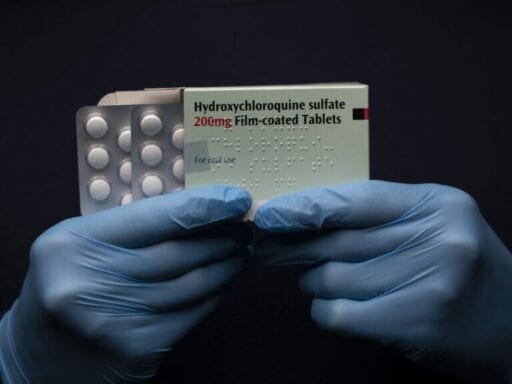There’s little evidence that hydroxychloroquine helps Covid-19 patients, but there were problems with the study suggesting it’s actively deadly.
The Lancet, one of the world’s leading journals in medical science, has retracted a paper finding that the malaria drugs chloroquine and hydroxychloroquine, touted by President Trump as Covid-19 treatments, increase mortality in patients.
To be clear, there is, as of this writing, little evidence that chloroquine and hydroxychloroquine are effective treatments for Covid-19, in spite of their popularity as an “alternative remedy” that even Trump himself says he has taken as a prophylactic. Research on the topic is ongoing; on Wednesday, a major randomized controlled trial of hydroxychloroquine as a Covid-19 prevention drug found no benefits.
But three of the Lancet paper’s four authors, Mandeep Mehra, Frank Ruschitzka, and Amit Patel, of Harvard Medical School, the University of Zurich, and the University of Utah respectively, said in their retraction statement that they “can no longer vouch for the veracity of the primary data sources.”
As Vox’s Kelsey Piper reported, scientists began expressing skepticism about the paper soon after its release. The paper did not find a relationship between the dose of the drug given and the mortality rate in patients, which is inconsistent with what we know about chloroquine and hydroxychloroquine deaths in other contexts. And the paper reported more deaths in Australian hospitals than the Australian government did, according to the Guardian.
Subsequent reporting revealed much deeper problems with the data source that Mehra et al used. They relied on a US company called Surgisphere, a secretive firm that a Guardian investigation revealed to be, at the very least, suspicious in nature. Many of its 11 employees (per its CEO) appeared to lack any scientific background; one was a science fiction author and fantasy artist, and another an “adult model and events hostess.”
“Until Monday, the ‘get in touch’ link on Surgisphere’s homepage redirected to a WordPress template for a cryptocurrency website, raising questions about how hospitals could easily contact the company to join its database,” the Guardian’s Melissa Davey, Stephanie Kirchgaessner, and Sarah Boseley wrote.
One of the few employees who does have a scientific background is chief executive Sapan Desai, who co-authored the Lancet paper; his name was conspicuously absent from the retraction notice, which detailed that Surgisphere was not complying with requests from the journal to examine their data in more detail. Desai told the Guardian that Surgisphere works by compiling data from hospitals that has been anonymized by the hospitals before being fed into the database, for patient privacy.
But per the Guardian’s Davey, “not one major Australian hospital spoken to by Guardian Australia had heard of Surgisphere or the database,” and “doctors from hospitals around the world scoffed at the idea that staff would have time to de-identify patient data and contribute to a US database in the middle of a pandemic.”
The Lancet is not alone in distancing itself from Surgisphere data. Another paper coauthored by Mehra, Patel, and Desai was retracted from the New England Journal of Medicine because the authors were “unable to validate the primary data sources” — which is to say, the Surgisphere data it relied upon.
The Covid-19 pandemic is an unprecedented situation where the pressure to contribute to scientific knowledge about the disease is immense and, with more than 100,000 new cases being diagnosed every day, time is of the essence. That creates incentives to try out new data sources that allow researchers to do statistical analysis right now, without conducting new trials. But this pressure also runs the risk of incentivizing low-quality data sources and even outright frauds. We don’t know for sure what Surgisphere’s data is yet, but it’s unlikely to be the last firm to face accusations like this.
Support Vox’s explanatory journalism
Every day at Vox, we aim to answer your most important questions and provide you, and our audience around the world, with information that has the power to save lives. Our mission has never been more vital than it is in this moment: to empower you through understanding. Vox’s work is reaching more people than ever, but our distinctive brand of explanatory journalism takes resources — particularly during a pandemic and an economic downturn. Your financial contribution will not constitute a donation, but it will enable our staff to continue to offer free articles, videos, and podcasts at the quality and volume that this moment requires. Please consider making a contribution to Vox today.
Author: Dylan Matthews
Read More



